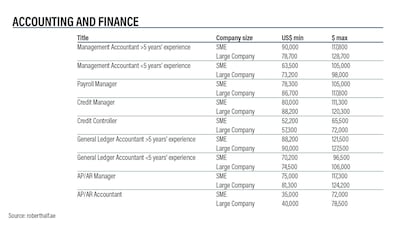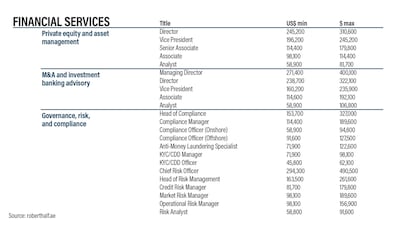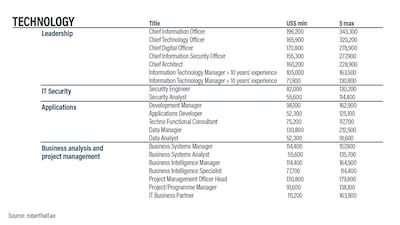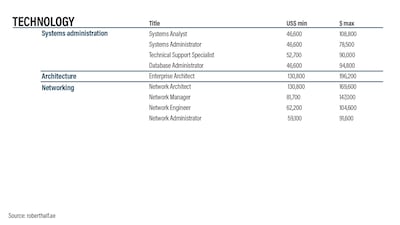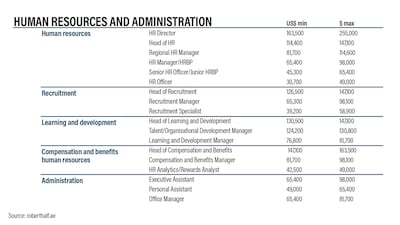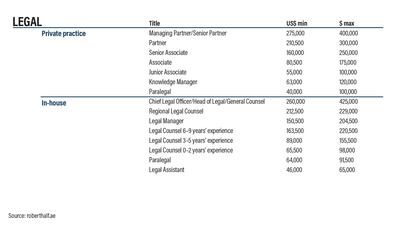A tax-free salary is no longer enough to attract and retain the best candidates as employees seek other career benefits as well, a new study from global recruitment consultancy Michael Page found.
According to the company’s Middle East Salary Survey 2019, pay expectations are now multi-layered in the UAE, as candidates focus more on career development, organisational culture and flexibility than a raise.
“Whereas previously a salary increase when changing employers was expected to be around 10–15 per cent - sometimes more in certain sectors - candidates are now wanting more detail about career development plans and organisation culture, which also includes an approach to maintaining a flexible work environment,” said Leith Ramsay, managing director of Page Group Middle East, the parent company of Michael Page Middle East.
With more more talent on the ground "committing their careers and long term future to the region than ever before," Mr Ramsay said a tax-free salary is "no longer enough" to secure top candidates.
__________
Read more:
UAE salary guide 2019: How much should you be earning?
UAE employees can expect a 4.8 per cent pay rise next year
Improved UAE job market but no significant salary rises in 2019, new report says
__________
Salaries in the UAE are projected to increase by 4.8 per cent across all industries this year, according to a November report from global consulting firm Mercer, as the job market heats up amid the government's diversification efforts.
Michael Page said while 2018 saw recruitment activity across every industry, this does not mean that every sector is on the up.
“Ultimately it has come down to which organisations made intelligent and proactive decisions in the last two years - post the first quarter 2016 oil price collapse,” said Mr Ramsay.
The study, which analyses salaries based on actual placements made throughout a given year, said there are key skills all sectors want in 2019. They include data science and analytics as well as procurement and cost management, particularly professionals “who have experience in reducing cost or spend across an enterprise whilst not negatively impacting productivity". Other important skills include governance and compliance.
According to the study, a regional chief financial officer in the finance and accounting sector can expect an average monthly income of Dh85,000 in the SME sector and Dh120,000 working for a multinational company. This figure includes the basic salary plus housing and transport.
Meanwhile, a chief information officer in the tech sector can expect an average monthly salary of Dh80,000 in the SME sector and Dh105,000 working for a global firm, while a chief in a company’s strategy department can command an average of Dh67,500 with an SME firm and Dh90,000 with a multinational.
_________
Read more:
UAE economy growth drives 'war on talent' for tech professionals
A fifth of UAE expatriates doubled their salary when they relocated
Is the UAE's new five-year visa a game changer for expat retirement?
__________
A December report from recruitment firm Cooper Fitch said the UAE employment market will pick up this year, but workers should not expect any major increase in salaries.
The company's 2019 Salary Guide revealed optimism for next year on the back of higher average oil prices and gross domestic growth of 4.2 per cent, according to Central Bank of the UAE estimates.
October research from global recruitment firm Robert Half found UAE business leaders are confident about their companies' prospects for this year, as growth in the economy and digital technology adoption drives demand for high-skilled professionals. However, the fresh momentum is now leading to a "war" for digitally savvy talent.
The UAE jobs market received a boost in recent months thanks to a raft of reforms rolled out by the Government, designed to accelerate economic growth, create jobs and diversify the economy. Measures include more relaxed visa options for professionals, retirees and residents between jobs.
The Michael Page study found government spending in both the UAE and Saudi Arabia will continue to play a huge role in regional growth this year.
“The private sector still remains heavily reliant on major projects which drive hiring requirements across key sectors, namely financial services, energy and property and construction,” said Mr Ramsay.
“Government spending, driven by an improved rolling annual oil price translated into improved market confidence – we felt this via an all-time record number of new job acquisitions in 2018.”
A December poll carried out among UAE residents by The National found that 14 per cent of the 2,700 who participated received a pay rise of more than 3 per cent in 2018.
Forty per cent said they are expecting a pay rise in 2019, while 54 per cent said their company does not increase salaries.
______________




